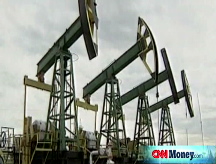Drill-baby-drill, meet $75 oil
As the price of crude tumbles from the summer's record highs, what will become of the push to increase drilling?
NEW YORK (CNNMoney.com) -- "Drill-baby-drill!"
With the price of oil falling below $75 a barrel Wednesday - down about 49% from last summer's highs - the industry's battle cry is sounding less and less convincing.
But falling oil prices are not the only reason why the air is coming out of the drilling balloon. The credit crunch has hampered oil companies' ability to fund big-ticket drilling projects. Meanwhile, the prices that producers pay for raw materials and labor remain high.
"Any project that assumed oil would average $100 over the next 10 to 20 years is being seriously reconsidered at this time," said Richard Ward, senior cost analyst at IHS Cambridge Energy Research Associates (CERA).
As recently as July, tapping deep water sources and extracting crude from Canadian oil sands - two very expensive production methods - were seen as economically viable ways to deal with the energy crisis. At that time, the price of oil was above $140 a barrel.
Now that the price has fallen below $75 a barrel, and could go even lower, many experts say the future of these projects is uncertain.
Prices. Oil companies are quick to point out that big drilling projects are long-term investments, which are not based on today's oil price, but on what they think the price will be in the future.
Indeed, some deep water projects have a life span of 20 to 30 years. And some producers expect to be mining Canada's oil sands for up to 40 years.
"Companies in the industry know that prices are volatile," said Ron Planting, an analyst at the American Petroleum Institute. "They probably did not plan projects that would only work at $140 a barrel."
Greg Stringham, a spokesman for the Canadian Association of Petroleum Producers, said most oil companies have kept their price scenarios below $100 a barrel.
While producers have had to make "massive adjustments to their budgets" in light of the decline in oil prices, companies are not backing out, Stringham said.
Mickey Driver, a spokesman for Chevron Corp. (CVX, Fortune 500), said the company has not "changed the scope of our current capital program," and that "we take a long-term view in our business planning."
A spokesman for Royal Dutch Shell (RDS.A) declined to comment because the company is in a 'quiet period' before they release quarterly results.
Still, if prices remain low for a prolonged period of time, many analysts expect oil companies to start cutting losses on some high-end projects.
For example, projects based in the Canadian oil sands, where it can cost about $70 to extract one barrel of marketable oil, could be among the first to feel the impact.
If the price of oil falls firmly below $60 a barrel, "you may see some consolidation in the Canadian oil sands," Ward said.
Given rapidly declining prices, tight credit conditions, high input costs and weakening demand - the outlook for bold new oil exploration is grim.
Companies that aren't able to weather a protracted low oil price scenario may find themselves selling operations.
"Expect some forced and unforced deals to be done," said Neal Dingmann, senior energy analyst at Dahlman Rose & Co. in Houston.
Credit. Falling oil prices are not the only economic challenge facing the oil industry.
Stringham points out that the credit crisis has hampered many oil producers ability to get affordable funding for big drilling operations.
While the credit markets have begun to show signs of a tentative thaw, the current climate remains difficult for borrowers.
Many of the oil industry's big offshore drilling projects are "highly levered," Dingmann said. And as long as credit remains tight, those projects will be on hold, he said.
Costs. In addition to credit concerns, oil companies are facing high costs for raw materials and labor.
Over the last four years, capital costs have increased more than 100% for the average exploration project, according to IHS/CERA data.
A sharp increase in the price of steel has been one of the biggest problems. The raw material is used to build drills, pipelines and tankers that make oil exploration possible.
Until recently, steel prices have been climbing along with copper and other key industrial materials.
But as the global economy slows, particularly in the developing world, steel prices on the London Metal Exchange have come down 60% from their July peak. And that could spell relief for oil producers.
Labor is another story.
The oil business is "the epitome of the boom-bust market," said Stephen Schork, independent analyst and publisher of the industry newsletter The Schork Report.
When the market was booming at the turn of the last century, labor was not a problem. But much of the industry's workforce left the business at the end of the last boom and went on to other careers, Schork said.
Given the dim prospects for a boom in the near future, those workers are not likely to return.
"They definitely have manpower shortage in the sector," Schork said. ![]()





